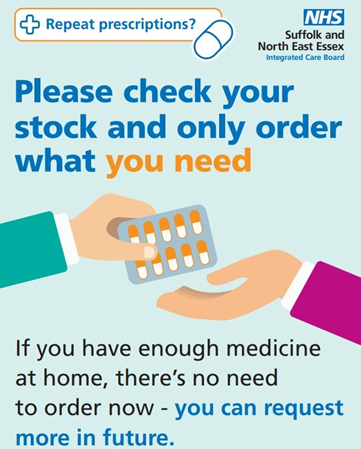Ordering repeat prescriptions
The easiest ways to order repeat prescriptions are online:
- using your NHS account (through the NHS website or in the NHS App)
- using the GP online system (SystmOnline) via the link at the top of this page
These accounts show you all your repeat medicine and dosage and you can choose the ones you need.
You can also:
- using the repeat prescription form attached to your previous prescription, put a tick against the medication you require and pop it through the letterbox.
- By post - Please address all repeat prescription requests to the 'Prescription Team' at the surgery.
Prescription Clerks CANNOT take medication requests over the telephone; this is to minimise the risk of a potential error.
Please allow TWO FULL WORKING DAYS for prescriptions to be processed and to arrive at your nominated Pharmacy and remember to take weekends and bank holidays into account.
Your Pharmacy may be able to sign you up for text alerts when your prescription is ready to collect.
For more information please visit: - Prescriptions - NHS (www.nhs.uk).
For prescription or medication queries, please phone our dedicated PRESCRIPTION LINE (option 2) and/or leave a message on their answering service and they will call you back (our RECEPTION team will NOT be able to help you).

Medicine Waste Campaign
The ICB has launched a campaign urging people to only order the medication they need from their repeat prescriptions.
A report by the Department of Health estimates that unused medicines cost the NHS around £300 million every year.
Tania Farrow, Medicines Optimisation Pharmacist as NHS Suffolk and North East Essex Integrated Care Board, said:
“We’re reminding people who have repeat prescriptions how important it is to check what medicines they have at home before placing an order.
“We know that a significant number of repeat prescription medicines are not used as intended and are returned to pharmacies for destruction.
“Ordering unnecessary medication can increase the risk of medicines shortages in pharmacies and we want to make sure essential medications are available to those who need them.”
Below is some useful advice for patients:
- Only order the medication if you need it - repeat items remain on your prescription even if you don’t order them every month.
- Try keeping all medication in one safe place at home, so you can see what you have left and what you need to reorder.
- For each prescription, take medication from one pill packet at a time, so you can keep a track of what you’ve taken and what you have left.
- Make a note on your calendar 7 to 10 days before your prescription due date to go through your medication and see what is left. Being organised in this way means that if bank holidays or weekends are coming up, you will have planned enough for these dates too.
In addition to asking patients to only order the medication they need, the NHS is also encouraging people - whenever possible - to take their medicines into hospital should they be admitted, whether it’s planned or unplanned.
This helps hospital staff to speed up care as they will have a complete record of the medicines the patient requires and means no doses will be missed.
To see the campaign and for more information visit:

CLINIC AND DISCHARGE LETTERS
At time of your discharge from hospital, you will have been provided with your regular medication as a 'TTO' (To Take Out). Any medication amendments will be reconciled by the Surgery, upon receipt of your discharge letter.
At your clinic appointment the Consultant might suggest prescribing new medicines for you or might want to make changes to the medicines that you are already taking. The Consultant is responsible for giving you the first prescription to collect from the hospital pharmacy.
Our Doctors will only be able to continue prescribing this medication if the consultant requests this in a written clinic letter. This process usually takes around TWO weeks upon receipt of the clinic letter.
Private Consultants may suggest medications to patients which would NOT normally be prescribed by NHS GPs. If either the Consultant or your GP informs you that this is the case, then you will need to contact your Consultant directly to organise prescriptions.
For more information please visit: -Being discharged from hospital - NHS (www.nhs.uk)
Please see this flowchart for Outpatient and remote patient consultations and supply of medicines.
Questions about your prescription
If you have questions about your medicine, your local pharmacists can answer these. They can also answer questions on medicines you can buy without a prescription.
The NHS website has information on how your medicine works, how and when to take it, possible side effects and answers to your common questions.
If you have a query about your prescrption, please call the surgery for advice.
Medication reviews
If you have a repeat prescription, we may ask you to come in for a regular review. We will be in touch when you need to come in for a review.
Prescriptions Charges and Exemptions
Extensive exemption and remission arrangements protect those likely to have difficulty in paying charges (NHS prescription and dental charges, optical and hospital travel costs).
The NHS prescription charge is a flat-rate amount which successive Governments have thought it reasonable to charge for those who can afford to pay for their medicines. Prescription Prepayment Certificates (PPCs) offer real savings for people who need extensive medication.
NHS charges from 01 May 2024
These charges apply in England only. In Northern Ireland, Scotland and Wales prescriptions are free of charge.
- Prescription (per item): £9.90
- Prescription Prepayment Certificate – 3 month - £32.05
- Prescription Prepayment Certificate – 12 month - £114.50
- Prescription Prepayment Certificate - HRT - £19.80
If you will have to pay for four or more prescription items in three months, or more than 12 items in 12 months, you may find it cheaper to buy a PPC.
- Telephone advice and order line 0845 850 0030
- General Public - Buy or Renew a PPC On-line
There is further information about prescription exemptions and fees on the NHS website.
Find out more about prescription charges (nhs.uk).
What to do with old medicines
Take it to the pharmacy you got it from or bring it in to the surgery. Do not put it in your household bin or flush it down the toilet.
About pharmacists
As qualified healthcare professionals, pharmacists can offer advice on minor illnesses such as:
- coughs
- colds
- sore throats
- tummy trouble
- aches and pains
They can also advise on medicine that you can buy without a prescription.
Many pharmacies are open until late and at weekends. You do not need an appointment.
Most pharmacies have a private consultation room where you can discuss issues with pharmacy staff without being overheard.